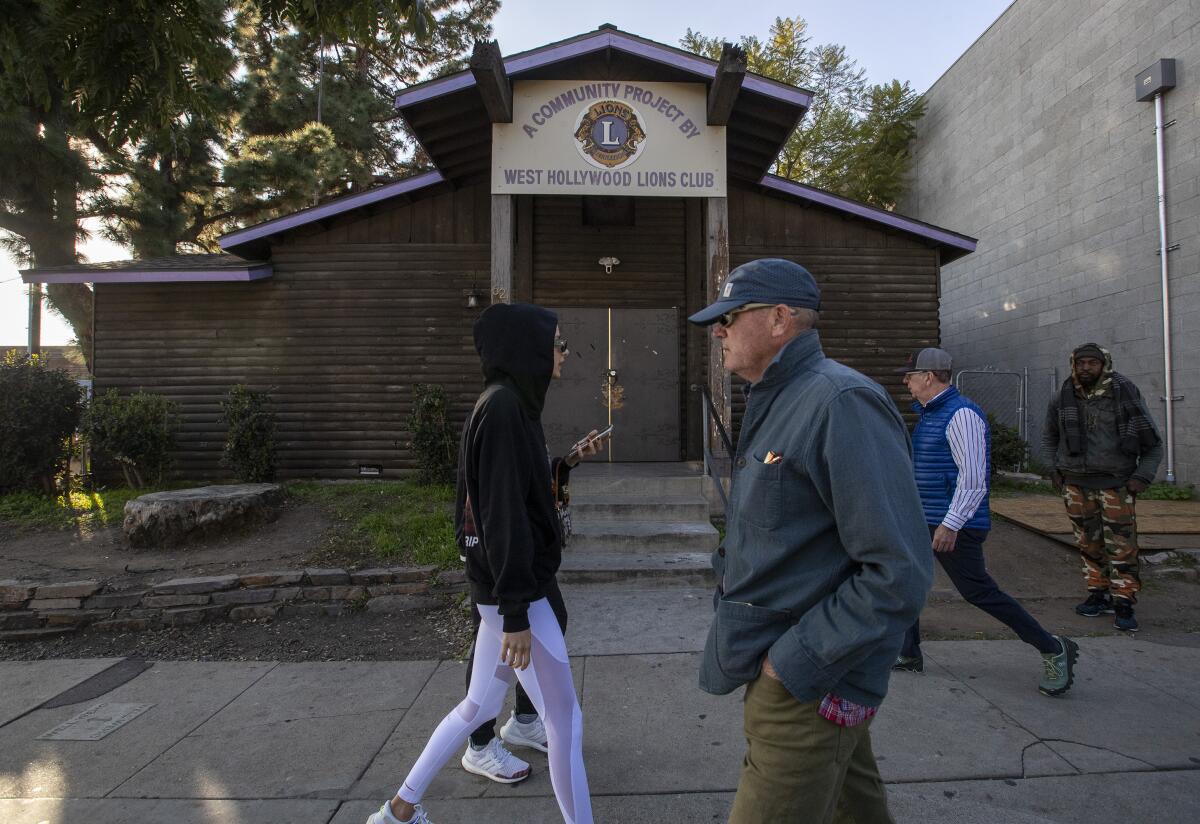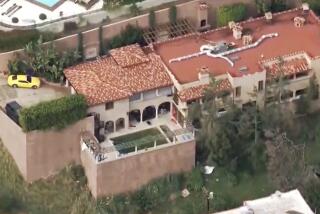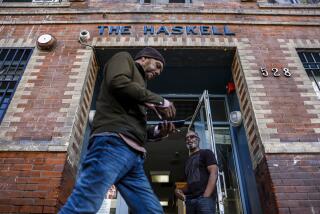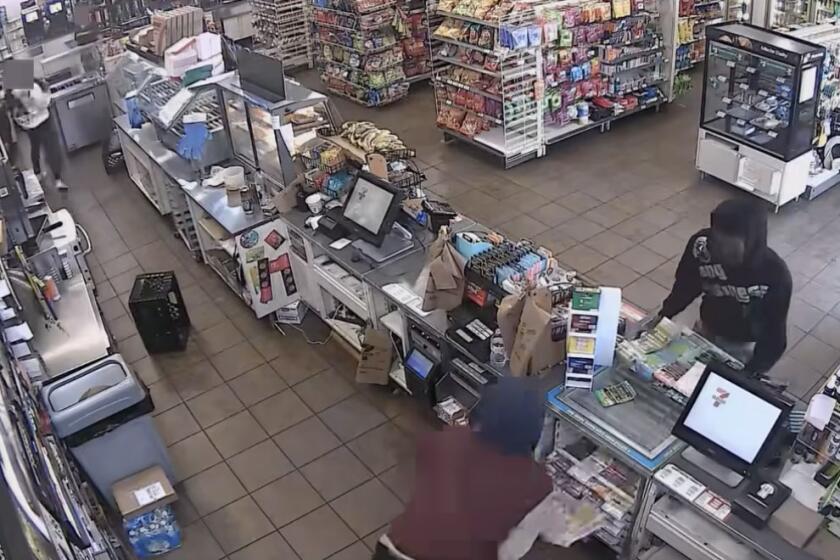This log cabin is a haven for sobriety groups. Beverly Hills wants it removed

On a posh stretch of Robertson Boulevard, one of these really stands out: A Kundalini yoga studio. A restaurant owned by former “Real Housewives of Beverly Hills” star Lisa Vanderpump. The headquarters of the Hollywood Foreign Press Assn. A log cabin.
Yes, a log cabin.
Far from the forest, the shabby little cabin with peeling paint and battered wooden doors has become the center of a property dispute between West Hollywood and Beverly Hills, two tony cities where land is both scarce and expensive.
The log cabin — the site of some two dozen addiction recovery group meetings every week — is in West Hollywood. But it sits on a lot owned by Beverly Hills, which wants it gone.
“To many people, the log cabin looks rustic. It looks like a crappy building,” said West Hollywood City Councilman John Duran. “To us, it’s a place where a lot of miracles have happened.”
For decades, the cabin has been managed by the West Hollywood Lions Club, whose emblem is displayed prominently on the building’s facade. But Beverly Hills officials said they recently learned that the Lions Club lease expired in 1977 and that the longtime nominal rent of $1 per year had not been paid for more than four decades.
“I can’t speak to why years have passed and it wasn’t discussed earlier,” Beverly Hills spokesman Keith Sterling told the Los Angeles Times. “A few years ago, we started to take a closer look at our real estate holdings, the current status of leases and agreements, and this was discovered.”
Last week, Beverly Hills City Manager George Chavez told the Lions Club in a letter that they must remove the cabin and its foundation from the property at 621 N. Robertson by March 31.
Gyula Kangiszer, president of the West Hollywood Lions Club, said his small club was “completely surprised” by the notice and had held prior discussions with Beverly Hills officials over how to extend the dormant lease and keep the building open for the sobriety groups.
“We have been serving a community need, and the cities were appreciative of this service,” Kangiszer said. “Now, I can only guess what the motivation would be.
“Beverly Hills has not collected the $1 rent for quite some time. I can make a check to Beverly Hills and send it: ‘Here’s $100 for 100 years.’”
The sudden deadline also came as a surprise to West Hollywood officials, who have discussed acquiring the lot from their neighboring city. The West Hollywood City Council discussed the price and terms of a possible lease in a closed-session meeting in September, but few details about negotiations are publicly available.
A West Hollywood historic resources survey filled out by a former assistant city planner in 1987 says the log cabin was built in 1928 as a Boy Scouts clubhouse on land donated by the Lions Club. Other city documents say it was built in the 1930s.
It predates West Hollywood becoming a city in 1984, and, for a time, Beverly Hills operated a water well on the site, Sterling said.
West Hollywood spokeswoman Lisa Belsanti said the West Hollywood City Council was interested in paying “a fair price” for the lot and is primarily concerned with keeping it available for addiction recovery. West Hollywood already leases a small parking lot on the property, she said.
“We’ve tried, but we were not able to reach an agreement in terms of the value,” Duran said. “Beverly Hills was was looking for highest and best value, and we’re saying current use. ... This stuff spans decades, and no one’s cared until just recently because commercial real estate is booming.”
Sterling said Beverly Hills does not currently have development plans for the property.
Beverly Hills’ demand that the building be removed — and the fear that it could be demolished — sparked an outcry in the sober community and beyond, with many people saying meetings at the cabin saved their lives. A Change.org petition asking that the cabin be preserved had collected about 8,000 signatures as of Wednesday.
Erin Khar, an author whose upcoming memoir about her longtime heroin addiction mentions the cabin, attended her first Alcoholics Anonymous meeting at there in 1997, when she was 23. She came to Monday-night meetings for years.
The building was unique in that it was almost entirely dedicated to recovery groups, unlike church basements and other multi-purpose rooms where meetings typically take place, she said.
“I loved that it was this weird little log cabin right there on Robertson,” Khar said. “There was some element in the way that it looked and the conversations and the fellowship that took place not just inside but on the steps out front — it really had that clubhouse feeling.
“For a lot of people in recovery, that sense of community is important.”
Duran said he has been attending weekly Alcoholics Anonymous meetings at the cabin for the last 23 years. Each recovery group is autonomous, with its own key to the building, and each is now scrambling to find a new meeting place, he said.
There is a critical shortage of spaces in West Hollywood that can and will accommodate addiction recovery groups, he said. The newly renovated West Hollywood Recovery Center, in a city-owned building across the street from the log cabin, already has a full meeting schedule, he said.
“The demand for recovery is very high, and the space is very limited,” said Duran.
Amid the public outcry this week, Beverly Hills and West Hollywood put out a joint statement saying they were trying to determine a “shared approach” to finding space for the recovery groups. Beverly Hills, the statement said, has offered to provide meeting locations as discussions over the property continue.
According to the statement, a Beverly Hills contractor recently “found portions of the building in poor condition.”
West Hollywood city officials said the log cabin has no central heat or air conditioning and needs renovations to become compliant with the Americans with Disabilities Act.
Kangiszer, who became president of the West Hollywood Lions Club a few months ago, said his club has invested in the building, upgrading its floor, painting the exterior trim purple, making repairs and installing security cameras.
But the club — which consists of about 30 aging members who meet in various locations in Los Angeles and Orange counties in addition to the log cabin — has held off on other upgrades for at least a year because of uncertainty about the property, he said.
“We as the Lions Club are committed to improving the surroundings and the building,” Kangiszer said. “We just want to make sure the building will be able to stay there for generations to come.”
More to Read
Start your day right
Sign up for Essential California for news, features and recommendations from the L.A. Times and beyond in your inbox six days a week.
You may occasionally receive promotional content from the Los Angeles Times.







